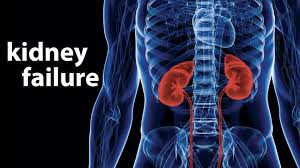- Home
- Editorial
- News
- Practice Guidelines
- Anesthesiology Guidelines
- Cancer Guidelines
- Cardiac Sciences Guidelines
- Critical Care Guidelines
- Dentistry Guidelines
- Dermatology Guidelines
- Diabetes and Endo Guidelines
- Diagnostics Guidelines
- ENT Guidelines
- Featured Practice Guidelines
- Gastroenterology Guidelines
- Geriatrics Guidelines
- Medicine Guidelines
- Nephrology Guidelines
- Neurosciences Guidelines
- Obs and Gynae Guidelines
- Ophthalmology Guidelines
- Orthopaedics Guidelines
- Paediatrics Guidelines
- Psychiatry Guidelines
- Pulmonology Guidelines
- Radiology Guidelines
- Surgery Guidelines
- Urology Guidelines
High levels of inflammatory marker linked with kidney function decline

A new study conducted in a large multi-ethnic group of healthy individuals has found that high circulating levels of an inflammatory marker are linked with the long-term decline of kidney function. It may lead to new insights into the mechanisms behind the development of kidney disease. The results have appeared in the Journal of the American Society of Nephrology (JASN).
Tumor necrosis factor receptor-1 (TNFR-1), which is known to contribute to inflammation and dysfunction in the endothelial cells that line blood vessels, is expressed by certain cells in the kidney. Studies previously demonstrated that blood levels of soluble TNFR-1 (sTNFR-1) are linked with kidney disease progression in individuals with established kidney disease. To assess sTNFR-1's role in kidney function changes in the general population, Pavan K. Bhatraju, MD, MSc (University of Washington School of Medicine) and his colleagues conducted a multi-ethnic study of 2548 adults with an average age of 61 years. Study participants were generally free of known kidney or heart disease at the start of the study when sTNFR-1 levels were measured.
sTNFR-1 was associated with substantial differences in kidney function decline over time. Rates of decline over 10 years were nearly 4-times higher among people in the highest vs. lowest sTNFR-1 categories. This association was independent of previously known risk factors for kidney disease progression and persisted across multiple sub-groups of participants.
"Many people continue to progressively lose kidney function despite treatment with current medications. New treatments are urgently needed to help prevent or slow the loss of kidney function," said Dr. Bhatraju. "Our studies identify a novel marker that is strongly related to kidney function decline over time in a large multi-ethnic cohort and suggest follow up studies are warranted to investigate the potential role of sTNFR-1 in the development of kidney function decline."
For more details click on the link: http://dx.

Disclaimer: This site is primarily intended for healthcare professionals. Any content/information on this website does not replace the advice of medical and/or health professionals and should not be construed as medical/diagnostic advice/endorsement or prescription. Use of this site is subject to our terms of use, privacy policy, advertisement policy. © 2020 Minerva Medical Treatment Pvt Ltd